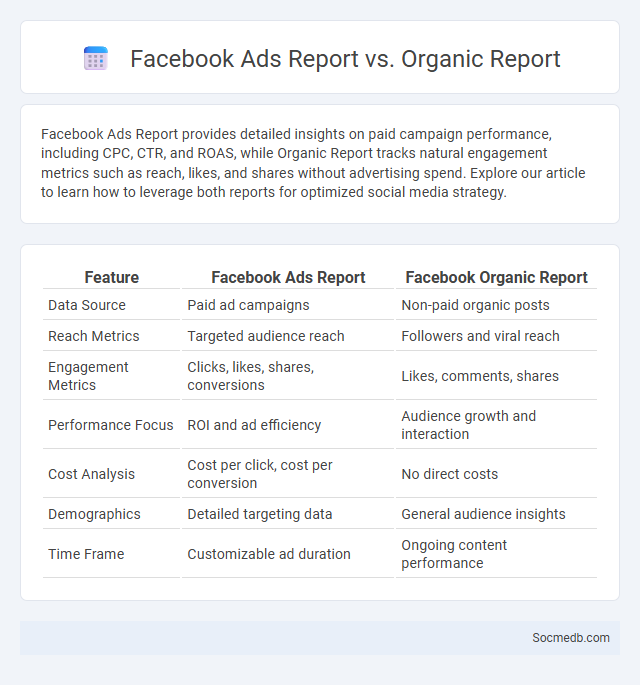
Photo illustration: Facebook Ads Report vs Organic Report
Facebook Ads Report provides detailed insights on paid campaign performance, including CPC, CTR, and ROAS, while Organic Report tracks natural engagement metrics such as reach, likes, and shares without advertising spend. Explore our article to learn how to leverage both reports for optimized social media strategy.
Table of Comparison
| Feature | Facebook Ads Report | Facebook Organic Report |
|---|---|---|
| Data Source | Paid ad campaigns | Non-paid organic posts |
| Reach Metrics | Targeted audience reach | Followers and viral reach |
| Engagement Metrics | Clicks, likes, shares, conversions | Likes, comments, shares |
| Performance Focus | ROI and ad efficiency | Audience growth and interaction |
| Cost Analysis | Cost per click, cost per conversion | No direct costs |
| Demographics | Detailed targeting data | General audience insights |
| Time Frame | Customizable ad duration | Ongoing content performance |
Introduction to Facebook Ads and Organic Reporting
Facebook Ads offer powerful tools to reach targeted audiences, leveraging detailed demographics and user behavior for precise ad placements. Organic reporting on Facebook provides insights into post engagement, reach, and user interactions, helping you analyze the effectiveness of your content strategy without paid promotion. Understanding both paid and organic metrics enables your brand to optimize campaigns and maximize social media ROI.
Key Differences Between Facebook Ads Report and Organic Report
Facebook Ads Report provides detailed metrics on paid campaign performance, including reach, impressions, cost per click, and conversion rates, enabling you to optimize your advertising budget. In contrast, the Organic Report focuses on non-paid interactions, tracking metrics such as post engagement, follower growth, and organic reach to measure authentic audience connection. Understanding these key differences helps you accurately analyze and strategize your social media efforts for maximum impact.
Understanding Facebook Ads Report Metrics
Facebook Ads Report metrics provide crucial insights into campaign performance by measuring key indicators such as impressions, click-through rate (CTR), conversion rate, and cost per result. Analyzing metrics like reach and frequency helps optimize audience targeting and budget allocation to increase ad effectiveness. Tracking engagement parameters including likes, shares, and comments reveals the ad's impact on user interaction and brand visibility.
Essential Metrics in Facebook Organic Reports
Facebook organic reports focus on essential metrics such as engagement rate, reach, and impressions to measure content performance. Monitoring metrics like post clicks, shares, and comments helps identify audience interaction and content relevance. Analyzing follower growth and page views offers insights into overall account health and organic reach trends.
The Role of General Reporting in Social Media
General reporting in social media plays a crucial role in maintaining platform integrity by enabling users to flag inappropriate or harmful content quickly. These reports help algorithms and moderators identify trends in violations, improving content regulation and enhancing user safety. Your proactive reporting contributes to a healthier online environment and supports the continuous improvement of community standards.
Comparing Performance: Paid Ads vs. Organic Reach
Analyzing social media performance reveals that paid ads deliver faster, targeted audience engagement through advanced algorithmic placements, while organic reach builds long-term brand loyalty and authentic interactions. Paid campaigns offer measurable ROI with precise metrics such as click-through rates and conversion tracking, contrasting with organic content's reliance on follower growth and engagement rates over time. Balancing investment between paid ads and organic strategies maximizes visibility and sustains user trust across platforms like Facebook, Instagram, and LinkedIn.
Advantages of Facebook Ads Reporting
Facebook Ads reporting provides detailed insights into campaign performance, enabling advertisers to track key metrics such as reach, engagement, conversions, and return on ad spend (ROAS). This data-driven approach allows marketers to optimize targeting, budget allocation, and creative strategies for improved effectiveness and cost-efficiency. By leveraging real-time analytics and customizable reports, businesses can enhance decision-making, boost campaign ROI, and achieve specific marketing objectives with greater precision.
Benefits of Facebook Organic Reporting
Facebook Organic Reporting provides valuable insights into audience engagement, reach, and content performance without paid promotion, helping businesses optimize their social media strategy effectively. It allows marketers to identify high-performing posts, track follower growth, and understand user demographics, enabling targeted content creation. By leveraging these analytics, brands can enhance authenticity, foster stronger community connections, and improve organic visibility on the platform.
Integrating Ad and Organic Reports for Holistic Insights
Integrating ad and organic reports enables you to gain a comprehensive view of social media performance by combining paid campaign data with natural engagement metrics. This holistic approach uncovers trends and audience behaviors that isolated reports may miss, allowing for more informed strategy adjustments and budget allocation. By unifying these insights, your marketing efforts can achieve greater effectiveness and optimized ROI across platforms.
Best Practices for Effective Facebook Reporting
Effective Facebook reporting requires detailed analysis of key metrics such as engagement rate, reach, and conversion statistics to optimize campaign performance. Utilizing Facebook Insights allows for accurate tracking of audience demographics and behavior patterns, enabling data-driven decision-making. Consistent reporting intervals and clear visualization tools enhance the clarity and impact of performance evaluations.
 socmedb.com
socmedb.com